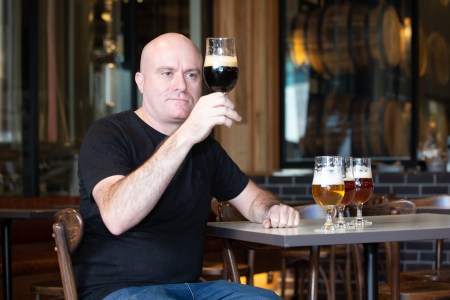
We sat down with homebrewing legend Steve ‘Hendo’ Henderson, brewing author, consultant and founder of Rockstar Brewer, for a chat about homebrewing in Australia.
Q: What advice would you give to someone looking to get into homebrewing?
Just start. Have fun. Make mistakes. Enjoy it over the long term for the awesome hobby that it is.
Q: How did you get into homebrewing? What made you fall in love with it?
I got into homebrewing through some friends and I winning a year’s supply of Evian water. The Evian was taking up too much space and we couldn’t get rid of it fast enough, so we decided to take it to my dad’s place and make some beer kit and kilo style. My recollection of my father homebrewing was bottles exploding under the house at 4am – I think he was brewing for cheap alcohol. Anyways – that first batch sucked but it eventually led me to do a post-grad in brewing.
Q: Who have been the greatest source of inspiration and education for you?
From the homebrew scene, I would say Charlie Papazian, John Palmer and The Brewing Network crew. Nowadays, I really like Brulosophy as they are running so many cool experiments. From the professional brewing world, it would be Brendan Varis from Feral and Sam Caligione from Dogfish Head. Between those two, they taught me to make beer well and to be creative at the same time.
Q: How much do you think homebrewing in Australia has changed in recent years/since you started? What do you think will happen in the future?
It wasn’t long ago, maybe 20 or 30 years, that homebrewing was a secret society where recipes and notes were photocopied and passed around and there was this air of mystery. Nowadays, the internet has revolutionised homebrewing through forums and social media where so much knowledge is shared. Add to that the online retailers have brought an even wider variety of ingredients to homebrewers and those same homebrewers are experimenting more than ever before. I firmly believe that homebrewers continue to drive the craft beer revolution to this day.
Q: What are the most common mistakes that people can avoid?
It used to be that micro infections and sanitation were common mistakes that homebrewers made. With more choice around cleaning and sanitising chemicals, the focus has switched to beer handling and, by that, I mean trying to avoid oxygen pickup when kegging or bottling your beer. Dissolved oxygen can cause all sorts of bad things to an otherwise well-brewed beer. CO2 is your friend.
Q: What steps can people take to improve their homebrewing?
I always say that the difference between a good brewer and a great brewer is two things: measure and control. Plan your brewing in advance, take measurements and keep good records. That way, if you make an amazing beer, you can repeat it and brew it again!
Q: Which of your recipes are your proudest of?
Prickly Moses ‘The Raconteur’ IPA. I homebrewed that beer more than a dozen times between commercial releases in order to refine the recipe. This was 2010, mind you so IPA hadn’t really become as ubiquitous as it is today, but The Raconteur taught me how to make IPA.
Q: Tell us about a disastrous homebrewing experience – what went wrong, what you learned from it, etc.
Well I might be a good professional brewer, but my homebrew house flavour is Acetaldehyde so there’s that. Also, I recently tried to brew a Kviek that was supposed to ferment at 37C and grew mould instead. Good times.
